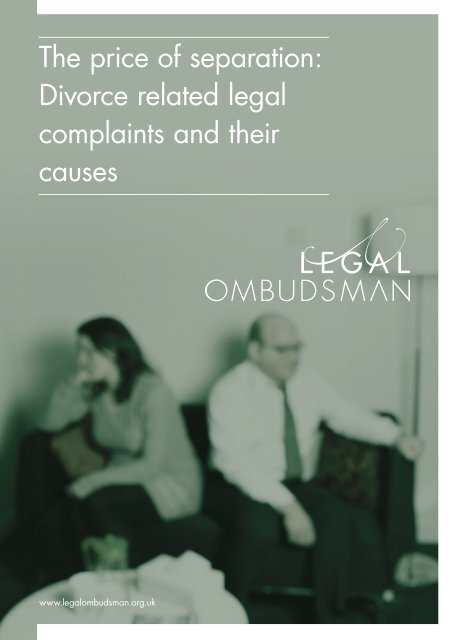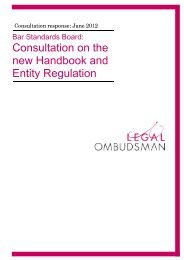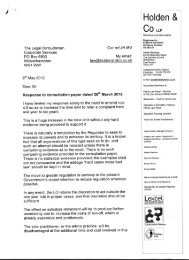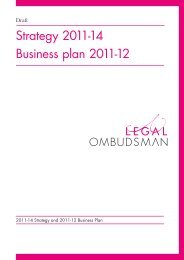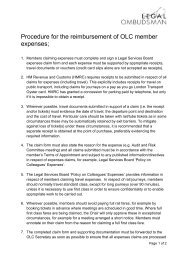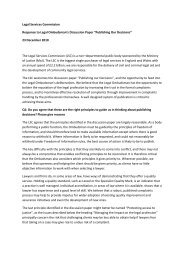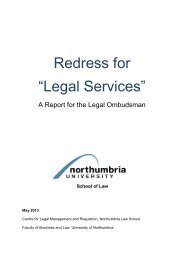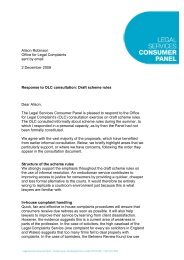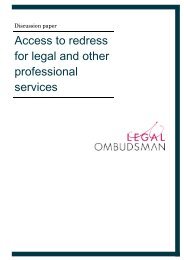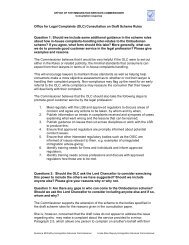The price of separation - Legal Ombudsman
The price of separation - Legal Ombudsman
The price of separation - Legal Ombudsman
Create successful ePaper yourself
Turn your PDF publications into a flip-book with our unique Google optimized e-Paper software.
ContentsSummary 01Introduction 01Managing cost 03On the meter 05Issues <strong>of</strong> quality 07Putting it right 09<strong>The</strong> matrimonial market 10Conclusion 12Case studies 13-20
01Summary1<strong>Legal</strong> <strong>Ombudsman</strong>,decisions and data– http://www.legalombudsman.org.uk/aboutus/complaints_data.html2BDRC Continental‘Individual consumerslegal needs report’,page 102 –https://research.legalservicesboard.org.uk/wp-content/media/2012-Individualconsumers-legal-needsreport.pdfFamily disputes currently give rise to more complaints tothe <strong>Legal</strong> <strong>Ombudsman</strong> than any other type <strong>of</strong> dispute.Around 18% <strong>of</strong> the complaints we investigate are aboutfamily law 1 . Of these, just over half are related todivorce. That is echoed by other findings about the level<strong>of</strong> customer satisfaction with divorce lawyers: forinstance, research has found that dissatisfaction levelsare higher in divorce cases (13%) than for other areas<strong>of</strong> law (average <strong>of</strong> 7%) 2 .<strong>The</strong> aim <strong>of</strong> this report is to attempt to cast some light on whydivorce leads to higher levels <strong>of</strong> dissatisfaction and morecomplaints than other areas <strong>of</strong> legal service. What can lawyers– and consumers – do to avoid finding themselves in disputesabout the service that has been provided? How can both partiesprotect themselves against deepening the distress <strong>of</strong> relationshipbreakdown with a subsequent dispute between lawyer andcustomer? And how will the coming changes to the legal sector –legislative, administrative and financial – impact on the situation?Introduction<strong>The</strong>re are some obvious reasons why divorce gives riseto a relatively higher number <strong>of</strong> complaints. Divorce canbe a deeply emotional event. Even the most consensual<strong>separation</strong> is likely to involve feelings <strong>of</strong> sadness,disappointment, and guilt, and <strong>separation</strong> may be nonconsensual,involving allegations <strong>of</strong> betrayal, abuse,and infidelity. Strong emotions can naturally colour andshape the customer’s approach to their legal service.<strong>The</strong> <strong>price</strong> <strong>of</strong> <strong>separation</strong>: Divorce related legal complaints and their causes
02In addition to the emotions involved, there are some veryimmediate and practical issues to sort out. <strong>The</strong>re is <strong>of</strong>ten a houseto be dealt with, possessions to be divided, children, pets andfriends to be negotiated about. And then there’s money: savings,present income and future income to be calculated and suitablearrangements to be made.It is against this background <strong>of</strong> emotion and practical need thatcouples facing divorce begin to engage with the formalities <strong>of</strong>law. Each partner has their own feelings, opinions and desires,which may well be in opposition to each other. Each will engagetheir own lawyer to help them negotiate what can feel like anopaque and sometimes unhelpful process <strong>of</strong> law. And each willbe investing in that lawyer their hopes and desires as regards theoutcome. This is the context in which divorce lawyers operate.Often, lawyers are able to help guide customers sensitively throughthe emotional and practical minefield that is the divorce process,enabling them to focus on what is in their best interests. However,there are some occasions where the quality <strong>of</strong> service falls short.This can be for a variety <strong>of</strong> reasons.This report seeks to illustrate the sorts <strong>of</strong> issues which can arise indivorce with eight case studies – the stories <strong>of</strong> real people whogot divorced and then needed the <strong>Legal</strong> <strong>Ombudsman</strong> to helpresolve an issue with their lawyer. Four are about the way thecost <strong>of</strong> a divorce can spiral out <strong>of</strong> control: poor cost information,excessive bills (as Miss A’s story <strong>of</strong> excessive photocopyingshows is possible), and the financial consequences <strong>of</strong> a lawyer’smistakes. Two are about the quality <strong>of</strong> the service provided,including one case where we referred a lawyer to the SolicitorsRegulation Authority for misconduct. <strong>The</strong> final two are examples <strong>of</strong>the unrealistic expectations with which some customers approachlawyers and where they blame their lawyer for the outcome <strong>of</strong> acase rather than a mistake they themselves have made.<strong>The</strong> <strong>price</strong> <strong>of</strong> <strong>separation</strong>: Divorce related legal complaints and their causes
03Managing cost<strong>The</strong> largest area for complaints on divorce is cost; aroundone quarter <strong>of</strong> the divorce complaints we deal with are onthis issue 3 . A BDRC legal benchmarking study recentlyestimated the average cost <strong>of</strong> divorce at around £1300per person 4 . However, divorces range from the relativelystraightforward to the complex. Moreover, the cost <strong>of</strong>divorce and the money spent on divorce lawyers can varysignificantly. <strong>The</strong>re are a number <strong>of</strong> reasons why the cost<strong>of</strong> obtaining a divorce can become an area for dispute.327% <strong>of</strong> divorce relatedlegal complaints to the<strong>Legal</strong> <strong>Ombudsman</strong> wereabout costs between 1April – 31 December20124BDRC Continental‘Individual consumerslegal needsreport’, page 99– https://research.legalservicesboard.org.uk/wp-content/media/2012-Individualconsumers-legal-needsreport.pdfMany divorces are relatively simple and straightforward. <strong>The</strong>separating partners may have agreed the shape <strong>of</strong> the settlementbefore the formal legal processes begin. If there is a high level<strong>of</strong> agreement, no children and few possessions to be divided up,a divorce can be speedy and low cost. Indeed, some are ableto divorce without paying for a lawyer to represent them at all.However, where there are complex legal issues involving children,property, differential incomes and pensions, there is an increasedrisk <strong>of</strong> an unexpected rise in cost. What may have begun as areasonably consensual process can sometimes spiral into protractedlitigation and end up with the family assets being eaten up in legalexpenditure.In this context, it is vital that lawyer and customer work togetherto manage the cost <strong>of</strong> the service. Clear communication andmutual trust are key. If the lawyer does not appreciate the financialpressures on the customer, or the customer fails to keep an eye onthe costs as they accumulate, the result can be that the lawyer endsup presenting the customer with a bill far higher than they expectedand which they simply cannot pay.<strong>The</strong> starting point should be that the lawyer provides a clear estimateabout what the cost <strong>of</strong> the divorce might be at the beginning <strong>of</strong>a case. However, the BDRC study showed that roughly a fifth <strong>of</strong>customers (21%) were not given an estimate <strong>of</strong> costs when firstconsulted. While it is certainly difficult for a lawyer to provide afixed <strong>price</strong> for a complex case with any certainty, and any estimatewill need to be hedged around with caveats, there appears to be nogood reason why a lawyer cannot at least provide a clear <strong>price</strong> for<strong>The</strong> <strong>price</strong> <strong>of</strong> <strong>separation</strong>: Divorce related legal complaints and their causes
04the initial work to be done, together with an estimate <strong>of</strong> the possiblerange <strong>of</strong> the ultimate cost <strong>of</strong> the divorce.Whether or not an estimate is given, it is essential that the lawyerkeeps the customer regularly updated as costs mount. Take Mrs C’scase: for her divorce and the associated ancillary relief work, herlawyer estimated costs <strong>of</strong> around £10,000. However, by the end <strong>of</strong>the case she was asked to pay more than double this amount. <strong>The</strong>firm had provided no updates about her escalating costs since theinitial estimate and no warning that the final bill would be so muchhigher than quoted. An ombudsman therefore decided the firmshould reduce its final bill by around £15,000.And given the current changes in the financing <strong>of</strong> divorce, thereis an increasing need for lawyers to be conscious <strong>of</strong> the cost<strong>of</strong> the service they provide. Changes to legal aid mean that anestimated 200,000 fewer cases each year 5 will be eligible forpublicly funded legal representation. People who previously wereable to fall back on state help to fund their divorces will now haveto fund them themselves; many low to middle income earners willhave to manage their legal budgets carefully. <strong>The</strong>re will also be anincreasing onus on lawyers to help them do so.An example <strong>of</strong> this type <strong>of</strong> issue can be seen in the case <strong>of</strong>Miss A. Miss A – unlike her relatively wealthy husband – wasunemployed and funding her divorce by borrowing money fromfriends and using credit cards. Her law firm knew her financialposition. Unfortunately, despite agreeing a budget with the firm atthe start <strong>of</strong> the process, she was told to pay costs <strong>of</strong> £15,000 overwhat was agreed. This included £4,000 for photocopying. Givenher limited means, she was unable to meet the firm’s demandsthat she borrow the outstanding sum. When we investigated, anombudsman decided that the firm had acted unreasonably and toldit to waive its additional charges.5BBC News ‘Familieshit by legal aid plans’– http://www.bbc.co.uk/news/business-17787359Cases like these are about more than just money. In both the casesabove, it was clear that the emotional distress that Miss A andMrs C had experienced during their divorce was deepened bythe fact that they were also finding themselves in dispute with theirlawyer. Although in both cases, it was the refund or reduction <strong>of</strong>fees which was central to the ombudsman’s decision, in both toothe ombudsman ordered some level <strong>of</strong> compensation to be paidfor the additional distress caused by failing to manage the issue <strong>of</strong>costs. Our guide for lawyers about costs is intended to assistlawyers and prevent these situations occurring.<strong>The</strong> <strong>price</strong> <strong>of</strong> <strong>separation</strong>: Divorce related legal complaints and their causes
05On the meterOne <strong>of</strong> the reasons why costs can spiral out <strong>of</strong> controllies in the emotional rawness <strong>of</strong> many <strong>of</strong> those goingthrough divorce proceedings. Divorce is <strong>of</strong>ten a lonelytime, where someone is facing very real uncertaintiesand taking important decisions, yet in a state <strong>of</strong> deepemotion. In those circumstances, it is common for peopleto become inflexible or change their minds (and thustheir instructions) during the divorce process. It is alsocommon for them to rely heavily on the one individualwho is both an expert in how to negotiate the processand who is seen to be on their side: their lawyer.Most divorce lawyers understand this dependency and dischargetheir responsibility to provide a measure <strong>of</strong> emotional support andguidance conscientiously and with admirable sensitivity. But thereis a tension in what lawyers do, which is particularly acute when itcomes to divorce.Law is a vocation, with lawyers bound by a pr<strong>of</strong>essional obligationto act in the best interests <strong>of</strong> their client, even where that may notalways be in line with what the customer is wanting at the time. Akey legal role is to save customers from themselves, to guide themaway from a course <strong>of</strong> action which may be destructive for themand persuade them to adopt a strategy with the best chance <strong>of</strong>enabling them to achieve their objectives. In the case <strong>of</strong> divorce,that may be to counsel them against prolonging the case or fightingan unwinnable fight: persuading them that although they are angryand upset at their spouse’s behaviour, court may not be the bestplace to fight out those emotions.But law is also a business, and lawyers in an increasinglycompetitive and financially challenging market need to maximisetheir returns to survive. In a context where charging is usually stilldone on the basis <strong>of</strong> time spent rather than results achieved, timespent lending a supportive ear and corresponding with the otherside soon mounts up in billable costs. Brutally put, cases whichresult in lengthy court hearings are <strong>of</strong>ten more pr<strong>of</strong>itable than caseswhich settle early.<strong>The</strong> <strong>price</strong> <strong>of</strong> <strong>separation</strong>: Divorce related legal complaints and their causes
06<strong>The</strong>se two pressures, then – the vocational and the financial – canbe in tension. Good lawyers, the majority <strong>of</strong> those with whom wedeal, manage these tensions with admirable deftness. But somelawyers, whether through their own inability or inexperience orbecause they are put under pressure by customers, allow cases tobe prolonged unnecessarily.In some <strong>of</strong> the cases we see, divorcing couples are clearlycommitted to pursuing their case whatever the consequences untilthe case becomes a ‘divorce <strong>of</strong> attrition’. If this happens, lawyerscan appear to be the only ones to benefit. Take Mrs B’s case:as neither she nor her husband was willing to compromise onwhat they wanted, her costs soon mounted. She was drawn into anacrimonious, drawn out legal battle and at the end <strong>of</strong> the case shefound to her horror that the final bill was nearly £70,000.After we investigated her case, we found that the firm’s serviceoverall had been reasonable. <strong>The</strong>y had also correctly chargedfor the work they had carried out. However, the firm had neithersought to challenge Mrs B’s approach nor inform her <strong>of</strong> hermounting costs – even when it became apparent that the costwould substantially exceed the original estimate. Consequently, weagreed an informal resolution with the firm and they reduced thebill by £30,000.For lawyers, the lesson here is to prioritise the need to helpcustomers manage their case. However, in some cases, the lawyerhas clearly done everything possible to dissuade the customer frompursuing an unacheiveable objective or unreasonable course <strong>of</strong>action. In those instances, the customer has to take responsibilityfor the outcome.Take the case <strong>of</strong> Mrs G: despite being advised that shecould reasonably expect around 50% <strong>of</strong> her and her estrangedhusband’s joint assets and £500 a month for spousal maintenance,Mrs G insisted she would hold out for 70% and £700 a month.When things didn’t work out as she had hoped, Mrs G complainedabout her lawyer to us. However, an ombudsman judged thatthe firm had given balanced and clear advice and had ultimatelyacted in her best interests. It was therefore decided that no poorservice had been provided.<strong>The</strong> <strong>price</strong> <strong>of</strong> <strong>separation</strong>: Divorce related legal complaints and their causes
07Issues <strong>of</strong> qualityIn many <strong>of</strong> the complaints we investigate, money is thecentral issue. However, issues <strong>of</strong> quality are alsosignificant.Whether or not a lawyer has a reputation for delivering qualityis clearly vitally important to customers: in the BDRC study 62%<strong>of</strong> legal service users said that reputation was key – making itthe biggest single driver for choosing a lawyer. And reputation isinfluenced most heavily by the standard <strong>of</strong> service being provided.Despite this, we see numerous cases in which service levels simplyaren’t good enough.Around 18% <strong>of</strong> divorce related complaints are about the lawyerfailing to provide adequate legal advice 6 . Where we found poorservice in this area, the key issue was <strong>of</strong>ten the poor standard <strong>of</strong>information provided to the customer. Sometimes, this lack <strong>of</strong> careand attention can have serious consequences. Take Ms E’s case:the extent <strong>of</strong> her lawyer’s errors and oversights meant that aftermonths <strong>of</strong> getting nowhere in her divorce case, she eventuallyhad to instruct another firm, incurring significant delays and costs.Ms E suffered with depression and anxiety, which she blamed onher lawyer’s failings. After investigating, an ombudsman decidedthat she should be reimbursed for fees, court costs and the cost<strong>of</strong> the additional work carried out by the second law firm, as wellreceiving compensation for her considerable distress.<strong>The</strong> lawyer was also reported to the Solicitors Regulation Authorityfor suspected misconduct.6 18% <strong>of</strong> matrimonialrelated legal complaintsto the <strong>Legal</strong> <strong>Ombudsman</strong>were about a failure toprovide adequate legaladvice between 1 April -31 December 2012Another example is Mr D’s case: he instructed someone hebelieved to be a ‘divorce specialist’ only to be on the receiving end<strong>of</strong> a catalogue <strong>of</strong> errors. At the same time, costs were building upwithout his knowledge.We found that the lawyer in fact knew very little about matrimoniallaw. He had been using Mr D’s money to pay a barrister to carryout simple tasks and had lost key documents. We ordered thelawyer to waive some <strong>of</strong> the outstanding fees and to award Mr Dcompensation for distress and inconvenience.<strong>The</strong> <strong>price</strong> <strong>of</strong> <strong>separation</strong>: Divorce related legal complaints and their causes
08And <strong>of</strong> course, issues do not just arise because <strong>of</strong> the behaviour <strong>of</strong>lawyers. Sometimes it is the customer whose behaviour creates theproblem. Take Mrs H’s case: she was unhappy with the settlementshe received following her divorce and blamed her law firm’s failureto make more <strong>of</strong> her husband’s alleged abusive past.However, it came to light that Mrs H had written affectionateletters to her husband during the divorce proceedings, making itdifficult to convince the court that he was abusive and that she wasscared <strong>of</strong> him. Following an investigation we found that the firmhad acted reasonably – Mrs H should have told them about hercorrespondence. If a customer does not communicate properly withthe lawyer, they cannot quibble if they do not get the result theywant.<strong>The</strong> <strong>price</strong> <strong>of</strong> <strong>separation</strong>: Divorce related legal complaints and their causes
09Putting it rightCentral to the <strong>Legal</strong> <strong>Ombudsman</strong>’s approach toinstances <strong>of</strong> poor service is seeking to put thecomplainant back in the position they would have beenin had the service been adequate. That is not alwayspossible. In many cases we see, although there hasbeen poor service, it is <strong>of</strong> a relatively minor sort andthere is no connection between the service failures weidentify and the disappointing case outcome that mayhave prompted the complaint in the first place. Minordelays, unimportant slips and overcharging are unlikelyto have had any real effect on the judge’s decision yetthey can be blamed by unhappy complainants for thefact that they did not get the settlement they sought. It istherefore not uncommon for an ombudsman’s decision tobe rejected by the complainant even where poor servicehas been identified.Where the poor service has resulted in a direct financial loss,imposing an appropriate remedy is usually possible. Take the case<strong>of</strong> Ms F, who had to spend money putting her lawyer’s mistakesright after he incorrectly advised her to sign a consent order. <strong>The</strong>mistake meant that Ms F would not receive money from all <strong>of</strong> herhusband’s pension schemes (to which she was entitled), leavingher out <strong>of</strong> pocket. To make matters worse, the firm failed to takeMs F’s complaint seriously meaning she had to bring it to the<strong>Legal</strong> <strong>Ombudsman</strong>. Once we had investigated, we were able toachieve an informal resolution by getting the firm to agree on areimbursement <strong>of</strong> £6,500.<strong>The</strong> firm could have saved themselves the time and expense <strong>of</strong>responding to an <strong>Ombudsman</strong> investigation if they had resolvedthe issues when Ms F raised her initial complaint.<strong>The</strong> <strong>price</strong> <strong>of</strong> <strong>separation</strong>: Divorce related legal complaints and their causes
<strong>The</strong> matrimonial market10<strong>The</strong> sorts <strong>of</strong> themes this report has been discussing arethe product <strong>of</strong> the existing divorce market. However, thatmarket is changing rapidly. How should consumers reactand how should lawyers respond? Will thosedevelopments help or hinder the situation?Some <strong>of</strong> the changes may increase pressure on lawyers andconsumers. <strong>The</strong> removal <strong>of</strong> legal aid will inevitably put pressure onservice providers to come up with ways <strong>of</strong> bridging the affordabilitygap for many people seeking a divorce.7 <strong>Legal</strong> Futures ‘Co-oplaunches fixed-fee familylaw service’ –http://www.legalfutures.co.uk/latest-news/co-oplaunches-fixed-fee-familylaw-service8 BDRC Continental‘Individual consumerslegal needs report’,page 96 –https://research.legalservicesboard.org.uk/wp-content/media/2012-Individualconsumers-legal-needsreport.pdf<strong>The</strong> emergence <strong>of</strong> high street brands and Alternative BusinessStructures (ABS) in recent years has already seen innovations in theway legal services are provided and paid for. Fixed <strong>price</strong> services,for example, at least give customers a different option to considerwhen managing a modest budget 7 , while online divorce packagesmay help to reduce costs by cutting down on overheads as long aswhat they <strong>of</strong>fer meets that particular consumer’s needs. However,there are pros and cons to all <strong>of</strong> these services - if we begin to seethe emergence <strong>of</strong> complex financing and legal service structures,with divorce being funded by cheap loans or insurance products,there are dangers <strong>of</strong> misselling and hidden costs.<strong>The</strong>re is also the danger <strong>of</strong> customers being confused about whereto turn for help if they experience problems: if divorce servicesare delivered in bank branches and funded by bank loans, manycomplainants will naturally assume that their avenue for redress sitswith the Financial rather than the <strong>Legal</strong> <strong>Ombudsman</strong>.Some new business models cut down on cost by centralisingservices and reducing customers’ access to face to face advice.Such models can work well for many customers. However,understandably in what is <strong>of</strong>ten a stressful time, many people valueface to face contact. Research indicates that almost half (45%)<strong>of</strong> people instructing a divorce lawyer factor the convenience <strong>of</strong>where they are located into the decision 8 . This could be due to theprotracted nature <strong>of</strong> divorce; going backwards and forwards to signdocuments, discuss court proceedings and so on will take its tollduring a long distance customer-lawyer relationship. Or it could bethat as divorce is a very personal matter, customers value a face t<strong>of</strong>ace service.<strong>The</strong> <strong>price</strong> <strong>of</strong> <strong>separation</strong>: Divorce related legal complaints and their causes
11<strong>The</strong> matrimonial market - continuedEither way, the location <strong>of</strong> a lawyer may also affect costs as anycourt hearings or mediation meetings would need to be local to thecustomer: a lawyer may charge for their travel time and expensesto attend them.Face to face meetings might also be important where a complexcase needs to be explained – it is no doubt reassuring to knowwe have our lawyer’s full attention, which can be harder to gaugeover the phone or by email. But <strong>of</strong> course, different models havepros and cons, and people will ultimately choose a service thatsuits their circumstances.9 <strong>The</strong> Independent ‘DIYdivorces set to surge aslegal aid vanishes’ –http://www.independent.co.uk/news/uk/home-news/diy-divorces-set-tosurge-as-legal-aidvanishes-8439826.html10 Ministry <strong>of</strong> Justice –http://www.justice.gov.uk/news/press-releases/moj/additional-10-millionto-fund-mediation-andhelp-separating-couplesavoid-court-battlesFor some people, DIY or online solutions will be increasinglyattractive 9 . This may also lead to an increase in the number <strong>of</strong>people representing themselves in court. We’ll be monitoring ourdata closely to see what, if any, impact it has on the number andtype <strong>of</strong> complaints we receive. Where people are interacting withonline services or purchasing DIY kits, the limits <strong>of</strong> regulation andour powers <strong>of</strong> redress become difficult to draw and there is adanger that customers may mistakenly believe that they are buyinga regulated service with a guarantee <strong>of</strong> support if something goeswrong.On a more positive note, the Ministry <strong>of</strong> Justice (MoJ) recentlyannounced that an additional £10 million will be made availableto help separating couples avoid court battles where possiblethrough increased access to mediation 10 . Assuming that couplescan come to some agreement about how assets and accessto children will be divided, mediation can <strong>of</strong>fer a simpler andcheaper route to sorting out the types <strong>of</strong> problem that typicallybeset the process <strong>of</strong> divorce. Though it is useful for some people,it may not work for all couples in all circumstances. As we resolvecomplaints about mediation lawyers, we will again be watchinghow this affects the <strong>Legal</strong> <strong>Ombudsman</strong>’s business.Of course, mediation is very much based on the assumption thatseparating couples can put the bitterness and hurt aside for thegreater good <strong>of</strong> everyone involved. As our case studies haveshown, sadly this is not always possible.<strong>The</strong> <strong>price</strong> <strong>of</strong> <strong>separation</strong>: Divorce related legal complaints and their causes
12ConclusionAs this report illustrates, there are very good reasons why wecan expect there to be more complaints about divorce thanalmost any other area <strong>of</strong> law. However, it is possible forlawyers and customers to manage the risks inherent indivorce better.For the lawyer, more work could be done to reduce complaints aboutcost. Giving proper estimates, updating customers regularly on costs,encouraging customers to manage costs better themselves, ensuring thatthey put the interests <strong>of</strong> a customer first: all these are vital to avoidingcomplaints. We hope that by highlighting some <strong>of</strong> the issues arounddivorce cases and costs (illustrated by the case studies in this report) andby re-publishing our lawyer’s guide to complaints about costs, we willassist lawyers to prevent complaints arising in the first place.As the market changes we’ve looked at come to fruition, the need forsensible cost estimates and regular updates throughout a case willbecome more pressing, not less so. And the reasons for good costspractice stack up: improved reputation, less complaints and potentiallymore business through recommendations. Though obvious, some lawyersstill undervalue good service and effective complaint handling proceduresas a means <strong>of</strong> retaining and gaining customers.With the possibility <strong>of</strong> more individuals representing themselves in thefuture, lawyers will be hoping that new ways <strong>of</strong> funding help to bringin customers. Providing decent service levels will also help to improveconsumer confidence, so that those with the means to pay are persuadedto do so.For those seeking a divorce, the lessons are equally important. As hard asit must be to keep emotions in check, the lessons from this report all pointtowards the necessity for divorcing couples to try. Taking an objectiveapproach and setting realistic objectives at the start <strong>of</strong> a case could bethe difference between £10,000 and £50,000 worth <strong>of</strong> legal fees.It will also be prudent for customers to keep tabs on how much they arespending throughout a case and to think carefully about what work theyare committing themselves to paying for. Fortunately, for any customerswho do find themselves caught out by unexpected costs or subject to anyother aspect <strong>of</strong> poor service, and where the lawyer is at fault, the <strong>Legal</strong><strong>Ombudsman</strong> is here to help.<strong>The</strong> <strong>price</strong> <strong>of</strong> <strong>separation</strong>: Divorce related legal complaints and their causes
13Case studies - Costs excessive or costsinformation deficient1. Divorce dire straitsMiss A needed a lawyer to help oversee divorce proceedings,which included both financial matters and issues around accessto her child. Little did she know it would end in tears andconsiderable worry over her family’s welfare, not to mention aninvoice for £4,000 worth <strong>of</strong> photocopying.<strong>The</strong> first law firm that Miss A instructed turned out to be very poor. Althoughshe’d already accrued some costs using them, she decided to pay theoutstanding bill and then use a different firm.Miss A settled on a second firm after shopping around for what she thoughtwould be an affordable, reputable divorce specialist.She met with the firm and discussed costs. She was conscious <strong>of</strong> the factthat she had recently been made redundant and that her husband hadconsiderably greater funds to draw on given his high paying job. However,she needed to get the best outcome for her and her child. So, despitehaving used much <strong>of</strong> her redundancy money on the first law firm Miss Aborrowed money from friends and used credit cards to pay the second firm.Miss A explained that once this money had gone she had nothing else; so,everything would need to be achieved within the specified budget. <strong>The</strong> lawfirm agreed to act on behalf <strong>of</strong> Miss A under this arrangement.Unfortunately, court proceedings dragged on and Miss A’s money wasquickly swallowed up. Miss A asked the firm to stop since she simplycouldn’t afford any further work. Despite this, the firm continued actingwithout her consent before eventually hitting her with an invoice for£15,000.Miss A did not have this money. She complained to the firm but theyrejected it, even using aggressive letters to insist she would have to pay theoutstanding costs. Miss A was so distressed, she worried more than everabout her child’s welfare given her dwindling funds and growing debt.Finally, Miss A brought her complaint to us. We investigated and agreedthat the firm had acted unreasonably, particularly in continuing to accruecosts when they had specifically been asked not to do any more work. Aninvestigator also discovered, after going through an itemised bill, that thefirm’s costs included an enormous £4,000 for photocopying.<strong>The</strong> <strong>price</strong> <strong>of</strong> <strong>separation</strong>: Divorce related legal complaints and their causes
14<strong>The</strong> firm contested the investigator’s remedy, which was for the firm towaive the outstanding £15,000, and so it went to an ombudsman decision.<strong>The</strong> ombudsman agreed the firm should waive the final bill and they wereordered to do so.2. Divorce <strong>of</strong> attritionAfter struggling for some years to keep her marriage together,Mrs B finally accepted things wouldn’t work out and instructeda firm to represent her in divorce proceedings.At first, the firm told Mrs B that the work would cost somewhere between£5,000 and £30,000. Provided that her husband didn’t contest the divorceand the work was straightforward, the cost would be towards the lower end<strong>of</strong> the estimate.As it turned out, the divorce wasn’t straightforward – Mr B wasuncompromising. Consequently, Mrs B was dragged into an acrimonious,drawn out legal battle. <strong>The</strong> divorce ended up taking over a year, with halfa dozen court appearances. By the time that Mrs B complained, the courtorder still hadn’t been finalised.Mrs B was unhappy with a number <strong>of</strong> aspects <strong>of</strong> the service she hadreceived, but her main complaint concerned the cost. In the course <strong>of</strong> theyear, her costs had increased dramatically. In fact, even though Mrs B hadbeen paying the firm regularly, she found to her horror that the final billwas nearly £70,000. Mrs B complained and the firm <strong>of</strong>fered to reduce thebill, but Mrs B wasn’t satisfied with their <strong>of</strong>fer.When we investigated, we found that, overall, the firm’s service had beenreasonable. <strong>The</strong>y had dealt as best they could with what turned out to be avery bitter and complicated divorce.However, they hadn’t provided Mrs B with regular costs updates, eventhough the work they were doing meant that those costs were increasingdramatically. Our investigator considered the evidence and was able tohelp Mrs A and the firm reach an informal resolution. <strong>The</strong> firm agreed toreduce the bill by £30,000, which Mrs A accepted. This left her with a littleunder £40,000 to pay.<strong>The</strong> <strong>price</strong> <strong>of</strong> <strong>separation</strong>: Divorce related legal complaints and their causes
153. Ancillary reliefMrs C had a number <strong>of</strong> family matters for which sherequired legal advice, so she approached a firmfollowing a friend’s recommendation.<strong>The</strong> firm provided the initial advice she was after and Mrs C wenton to instruct them in a number <strong>of</strong> matters, including her divorceand ancillary relief. <strong>The</strong> other matters included applying foraccess and residence orders, as well as defending against similarapplications that her husband was making. <strong>The</strong> overall estimate forthe work was £10,000.Work progressed and seemed to be going well. <strong>The</strong> firm instructeda barrister to provide advice, which Mrs C paid for. However, MrsC became uneasy about how much the work was costing her – notjust the cost <strong>of</strong> things like the barrister’s advice but also the cost <strong>of</strong>the work the firm itself was doing. She continued paying the billsdespite not being told about certain costs in advance. However,Mrs C eventually complained, asking for a detailed breakdown <strong>of</strong>all the costs.When we investigated, we found that the work the firm haddone seemed to be reasonable; however the costs situation wasconfusing, probably because the firm was dealing with more thanone matter at once.We found that the firm hadn’t kept Mrs C adequately informedabout how her costs were increasing – they had sent her bills butwe couldn’t see any evidence that they had discussed the positionwith her in advance. Without this, she wasn’t in a position to fullyunderstand her financial commitments or make informed decisionsabout the case. An ombudsman decided that the firm should limitits outstanding fees, so that the amount Mrs C owed was justover £5,000. This meant that the total bill was reduced by about£15,000.<strong>The</strong> <strong>price</strong> <strong>of</strong> <strong>separation</strong>: Divorce related legal complaints and their causes
164. Pricey and diceyMr D instructed a law firm to oversee his divorce afteran initial consultation in which the lawyer claimed to bea specialist in matrimonial law. Unfortunately, Mr Deventually discovered that the lawyer knew very littleabout matrimonial law, leading to a catalogue <strong>of</strong> errorsand escalating costs.Due to the lawyer’s lack <strong>of</strong> knowledge he continually misinformedMr D about his likelihood <strong>of</strong> success. This raised Mr D’sexpectations, but they were quickly dashed following a courtdecision to reject his application. <strong>The</strong> lawyer had also been hiringa barrister to complete simple forms at extra cost to Mr D. Heclaimed that had the firm known what they were doing they couldhave done the work themselves.<strong>The</strong> firm frequently failed to respond to telephone calls and emailsand managed to lose some <strong>of</strong> Mr D’s documents. To add insult toinjury, the firm had been building significant costs throughout thecase without giving Mr D any updates.It turned out that Mr D hadn’t received a client care letter orproper information about charges when he gave instructions tothe firm. <strong>The</strong>y had given Mr D a rough estimation during the firstconsultation but by the end <strong>of</strong> the case his costs had exceeded thissignificantly.We looked into the case and agreed that Mr D had received poorservice. In particular, he had been misled about the firm’s expertiseand how much his case was going to cost. As Mr D had only paidfor some <strong>of</strong> the work, an ombudsman decided the firm shouldwaive any outstanding fees and give Mr D some compensation fordistress and inconvenience. <strong>The</strong> total financial award came to over£5000.<strong>The</strong> <strong>price</strong> <strong>of</strong> <strong>separation</strong>: Divorce related legal complaints and their causes
17Case studies - Lawyer mistakes and poorinformation5. <strong>The</strong> break-up bluesMs E used a small high street law firm to help her file fordivorce. Unfortunately her case was strewn with errors,oversights and conduct issues on the part <strong>of</strong> the lawyerassigned to her case. Ms E was eventually left withdepression and sickness as a result <strong>of</strong> the unnecessaryworry she had to go through.Things went wrong right from the <strong>of</strong>f as the lawyer failed to tellMs E about a court date. <strong>The</strong> lawyer had also failed to pass therequired signed documents to her husband’s representatives.Ms E raised concerns but was assured the service would improveso she persevered.However, at a related financial hearing the lawyer appearedcompletely unprepared and he also appeared to have beendrinking. He subsequently failed to pass on all the informationrequired to give Ms E the best chance <strong>of</strong> success in her case.As a result she felt pressured to sign a financial settlement, despitenot being completely happy with it. She decided to go along withthe settlement just to get the whole ordeal over with. However, thelawyer even managed to mess this up. He failed to complete allrelevant sections <strong>of</strong> the paperwork and represented Ms E using hermaiden name, which made the whole document null and void.In the end Ms E had to instruct a new law firm to completeproceedings for her. This incurred considerable delays andadditional costs. By this time Ms E was suffering with depressionand anxiety. She wondered how much more she could take.After unsuccessfully complaining to her lawyer Ms E brought hercomplaint to the <strong>Legal</strong> <strong>Ombudsman</strong>. We agreed that the serviceshe had received was poor and ordered the firm to reimbursefees, court costs and the additional work carried out by a differentlaw firm to the value <strong>of</strong> £5000. We also awarded Ms E £500 incompensation for the distress and inconvenience caused.<strong>The</strong> <strong>price</strong> <strong>of</strong> <strong>separation</strong>: Divorce related legal complaints and their causes
18As the lawyer had allegedly been drinking while attending courtwe also forwarded details <strong>of</strong> the case to the Solicitors RegulationAuthority for potential misconduct.6. Confused consentMs F instructed a firm in her divorce and the associatedfinancial matters.<strong>The</strong> divorce went reasonably smoothly, all things considered, andMs F and her ex-husband decided to settle their finances witha consent order. One aspect <strong>of</strong> this involved negotiating whatproportion <strong>of</strong> her ex-husband’s pension Ms C would be entitled to.In fact, Ms F’s ex-husband had more than one pension and Ms Fassumed – because that was what she thought had been agreedbetween the firm and her ex-husband’s solicitors – that she wouldreceive half <strong>of</strong> all <strong>of</strong> the pensions. However, the way the consentorder was drafted didn’t make it clear and, when the firm askedher to approve an amendment they had made to it, she agreed.<strong>The</strong> consent order should’ve contained the policy numbers anddetails for all <strong>of</strong> her ex-husband’s pensions – it transpired thatthe order she signed didn’t. When Ms F was made aware <strong>of</strong> theproblem, after speaking to a financial advisor, she complained tothe firm. <strong>The</strong> firm denied any wrongdoing.Ms F was able to go back to court to sort out the problem, but itcost time and money. When we investigated, we found that thefirm had failed to properly explain the order to Ms F, or to ensurethat everyone was aware <strong>of</strong> the effect <strong>of</strong> the order in terms <strong>of</strong>the pension sharing. Nor did they help or advise Ms F once theproblem came to light.<strong>The</strong> investigator suggested that the firm should reimburse £6,500<strong>of</strong> the money that she had paid them to reflect the poor servicethey had provided. Ms F and the firm agreed that this was a fairresolution.<strong>The</strong> <strong>price</strong> <strong>of</strong> <strong>separation</strong>: Divorce related legal complaints and their causes
19Case studies - No poor service/unreasonable expectations7. Sound advice, poor choiceWhen a firm was instructed to help with Mrs G’s divorceeverything appeared to be going well at the start. <strong>The</strong>firm asked Mrs G to provide the full facts and figuresrelating to her finances and having reviewed her andher husband’s details, the firm said she could expectaround 50% <strong>of</strong> the joint assets, and £500 a month forspousal maintenance.Mrs G responded, saying she would hold out for £700 per monthspousal maintenance, and 70% <strong>of</strong> the joint assets. <strong>The</strong> firm agreedto put this to her husband. Her <strong>of</strong>fer was rejected, and mediationdid not seem to be getting them anywhere. Mrs G sought furtheradvice, and wanted to continue to push for her original <strong>of</strong>fer. <strong>The</strong>case was eventually scheduled to appear in court.Before the hearing Mrs G sought assurance that she would besuccessful if she continued. <strong>The</strong> firm explained that they could notdo this, nor had they ever been able to guarantee an outcome.Mrs G was advised to seek alternative advice if she wasconcerned about the advice given to her.<strong>The</strong> court case continued and the firm gave further advice to MrsG in order to try to resolve the case. She felt that they had goneback on their previous advice, and were now siding with herhusband. Mrs G raised a complaint with the firm and settled thecase by herself without further instructions to the firm. <strong>The</strong>n shebrought her complaint to us.Having looked into the matter, we felt that the firm gave balancedand clear advice, and were ultimately looking to obtain the bestsettlement possible. We did not find evidence that they hadguaranteed Mrs G any outcome. <strong>The</strong> firm, in response to Mrs G’scomplaints, had already <strong>of</strong>fered her £400 as a goodwill gesture,which she had not accepted. As we did not find there had beenany poor service, we did not ask the firm to make the payment, butsuggested Mrs G discuss this with the firm to see if the <strong>of</strong>fer wasstill open.<strong>The</strong> <strong>price</strong> <strong>of</strong> <strong>separation</strong>: Divorce related legal complaints and their causes
208. An unlikely storyMrs H instructed a firm to help with both her divorce andthe subsequent financial settlement. After receiving asettlement <strong>of</strong> around half <strong>of</strong> her and her ex-husband’sassets Mrs H complained that the firm failed to get herwhat she deserved – in particular she blamed the firm’sfailure to make more <strong>of</strong> her husband’s alleged abusivepast.However, it came to light in court that Mrs H had writtenaffectionate letters to her husband during the course <strong>of</strong> the divorce,making it difficult to convince the court that he was abusive andthat she was frightened <strong>of</strong> him.Nevertheless, Mrs H complained that she had wasted £30,000 instriving for a better settlement and wouldn’t have had to attend thehearings if the firm advised her properly.Mrs H wanted the firm to apologise and to pay compensation forthe distress they had caused her.Following an investigation, we found that the firm hadacted reasonably – Mrs H should have told them about hercorrespondence. <strong>The</strong> ombudsman agreed and noted that thenature <strong>of</strong> the letters to her husband contrasted with her witnessstatement against him, which made it unlikely that the court wouldorder the financial settlement she wanted. Mrs H rejected theombudsman’s decision.<strong>The</strong> <strong>price</strong> <strong>of</strong> <strong>separation</strong>: Divorce related legal complaints and their causes
How to contact usWe are open Monday to Friday between 8.30am and 5.30pm.If you are calling from overseas, please call +44 121 245 3050.For our minicom call 0300 555 1777.You can call us on 0300 555 0333(Calls to the <strong>Legal</strong> <strong>Ombudsman</strong> cost the same as a normal 01 or 02 landline number, evenfrom a mobile phone, and are recorded for training and monitoring purposes).You can also email us atenquiries@legalombudsman.org.ukIf you want to find out more about us and what we do, please visitwww.legalombudsman.org.ukWrite: If you prefer, you can write to us at<strong>Legal</strong> <strong>Ombudsman</strong>PO Box 6806WolverhamptonWV1 9WJ


